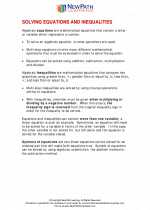Digital Money Study Guide
What is Digital Money?
Digital money, also known as electronic money or e-money, refers to a form of currency that is available only in digital or electronic form. It allows for instant transactions and can be used for various online and offline purchases.
Types of Digital Money
- Cryptocurrencies: Examples include Bitcoin, Ethereum, and Litecoin. These are decentralized digital currencies that use cryptography for security.
- Digital Wallets: These are applications or software that allow individuals to store, send, and receive digital currencies. Examples include PayPal, Venmo, and Apple Pay.
- Mobile Money: This refers to the use of a mobile phone for financial transactions, such as transferring money, making payments, and accessing banking services.
Advantages of Digital Money
- Convenience: Digital money allows for quick and easy transactions, eliminating the need for physical cash or checks.
- Accessibility: It provides access to financial services for individuals who may not have traditional bank accounts.
- Security: Digital money transactions can be encrypted and authenticated, reducing the risk of fraud and theft.
Challenges of Digital Money
- Security Concerns: Cybersecurity threats and hacking attacks pose risks to digital money systems.
- Regulatory Issues: The use of digital currencies is often subject to regulatory scrutiny and legal challenges.
- Technological Barriers: Not everyone has access to the technology required for digital money transactions, such as smartphones or internet connectivity.
Impact of Digital Money
Digital money has the potential to revolutionize the way we conduct financial transactions, providing greater financial inclusion and streamlining the payment process. It also challenges traditional banking systems and central authorities that control currency issuance.
Study Tips
- Understand the concepts of cryptography and blockchain technology, which underpin many digital currencies.
- Explore the history and evolution of digital money, including the development of key cryptocurrencies.
- Consider the social and economic implications of widespread adoption of digital money.
- Stay informed about the latest trends and developments in the digital money space, including regulatory changes and technological innovations.
◂Math Worksheets and Study Guides Eighth Grade. Solving equations and inequalities
Study Guide Solving equations and inequalities
Solving equations and inequalities  Worksheet/Answer key
Worksheet/Answer key Solving equations and inequalities
Solving equations and inequalities  Worksheet/Answer key
Worksheet/Answer key Solving equations and inequalities
Solving equations and inequalities  Worksheet/Answer key
Worksheet/Answer key Solving equations and inequalities
Solving equations and inequalities 

 Worksheet/Answer key
Worksheet/Answer key
 Worksheet/Answer key
Worksheet/Answer key
 Worksheet/Answer key
Worksheet/Answer key

The resources above cover the following skills:
Algebra (NCTM)
Represent and analyze mathematical situations and structures using algebraic symbols.
Develop an initial conceptual understanding of different uses of variables.